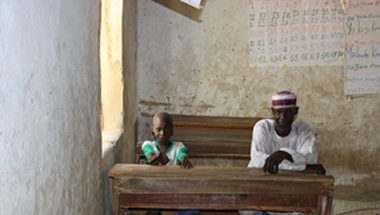Reaching More Children in Kano
‘’In just two months he has spent attending the new school, my son Abubakar can now read and write alphabets, tell the time and even write his own name. He spent two years attending a public primary school without being able to do any of these’’. Mohammed Adamu, a farmer and father of five in Albasu village, has come to the Local Government Education Authority to commend them and UKaid’s Education Sector Support Programme in Nigeria (ESSPIN) whose combined efforts are bringing remarkable improvements in Abubakar’s learning.
Schooling options are limited for boys like ten year old Abubakar living in Albasu, a remote rural community in Kano State, Northern Nigeria. There are a few public primary schools scattered across the expansive arid land and also several Tsangaya schools - community schools where young boys are taught to recite the Quran. Many of the students in Tsangaya schools have to leave home to live at a school far away and support themselves either through street begging or menial jobs after school. Abubakar is fortunate to live close to his local Tsangaya school and to now also go part-time to the new Daho Community School nearby.
Daho Community School is different. Albasu is one of three focal Local Government Areas (LGAs) where ESSPIN is working with government and communities to pilot the integration of traditional Islamic, Quranic and Tsangaya Education (IQTE) with elements of a modern, secular curriculum. Basic Maths, English, Social Studies and Hausa (the local language) are taught in addition to the Islamic subjects of the Tsangaya schools so that every child can get a more complete education. Abubakar’s teacher has undergone a series of ESSPIN-supported trainings to deliver child-centred learning and teach the children in an interactive way. With 28 new community supported schools established, the objective of this innovative approach is to bring a broader basic education to the grassroots, in a way that respects the local culture. Nearly 1,000 children and over 30 teachers have already benefited.
The advantages of this pilot are many. The communities have been carefully consulted as to the education choices they want to make for their boys and girls and have responded positively in supporting the initiative and providing resources. Beneficiaries are equipped with a modern education which is recognized by many local religious and traditional leaders as being an essential complement to Islamic study in a modern society. The community teachers trained by ESSPIN have acquired knowledge and skills they can pass on to generations to come. And the problem of having to choose between modern and Quranic education has been addressed by this process of community-led integration.
Mohammed Adamu has strong views on education. “I have been around in my years as a nomad and I have seen what people with an education can do. I have no money but I will try to the best of my ability to see that my children get an education. If communities and governments work together, it can be done. We built this school with our bare hands and this land, on which it stands, was donated by the village head’’.
With rising community demand for integrated IQTE schools in Kano state, ESSPIN is working with the local education authorities to ensure that communities and schools can provide broader educational opportunities for their children. Now Abubakar hopes to be a teacher himself one day.

Abubakar in his classroom with his father